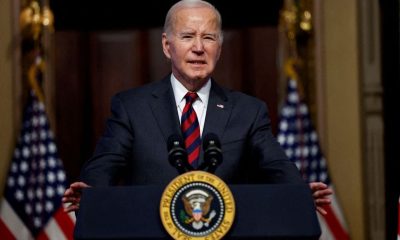Education
Students Nation Wide Are Missing Out On Education
Education has always been considered a great and necessary requirement for the youth of America. However, it can be difficult to mold the minds of tomorrow if they don’t show up to class. Based on recent studies by an Associated Press analysis of Education Department data, over 6.5 million students in the United States missed at least three weeks of school this past academic year.
This issue was especially prominent in Washington, D.C., our nation’s capital. Almost a third of the entire student body missed over two weeks of classes over the course of the year. Other states that had this issue were Washington and Alaska.
Every state differs in its rates of absenteeism. The average of students nation-wide who were missing school at an alarming rate was 13%. Bob Balfanz, the director of the Everyone Graduates Center, found this quantity shocking, and hypothesized that a correlation can be found between the absent students and the current high school dropout rate. “If you’re not there, you don’t learn, and then you fall behind, you don’t pass your classes, you don’t get the credits in high school and that’s what leads to dropping out,” he claimed.
There hardly seemed to be any particular demographic that was absent more so than others. Girls are just as likely to be missing school as boys, and not coming to school isn’t a habit that can be pinned down to a particular race. Students from all walks of life are skipping school to an outrageous extent.
These statistics don’t necessarily mean that all hope is lost; there were some states found to be on the complete opposite end of the spectrum. Florida exceeded all expectations. As it turns out, Floridian students were the most present in their studies – only 4.5 percent of students were repeatedly absent.
Balfanz proposed that the reason that kids are absent from school isn’t always truancy. Some students choose to not attend school for reasons regarding their family or even their own personal safety. (That’s not to say that there aren’t children in America who don’t just skip school for the fun of it.) Balfanz believes that the proper solution to this chronic absenteeism issue is to paint school and general education more positively in the eyes of the youth. Many children hate going to school. If their time in the classroom was more fun and positive, they would be more inclined to attend. Furthermore, each child who is absent to a remarkable extent should be asked why so a proper, individualized solution can be found.
There is absolutely no good reason why a young boy or girl should be missing three weeks or more of school out of one year. Things happen, and things come up, but to be missing out on an education is harmful in the long run and can have a detrimental effect on a child’s development. As recent disturbing statistics have shown, many students are falling behind in their educations – an issue that deserves national attention.
Featured Image via Flickr/Lead Beyond
AFRICA
President’s “Non-Starter” Deal Will Not End Shutdown
This week, shutdown polls showed the American public blame President Trump for the government shutdown. To divert Americans’ attention elsewhere, President Trump tried to make a deal with Democrats on Saturday. Among other elements, the deal consists of three years’ legislative relief to DACA recipients and a three-year extension of temporary protected status for 300,000 immigrants whose protected status is about to expire. In exchange for these provisions, $5.7 billion border wall funding will finally be paid for. The so-called deal is a non-starter because it contains the wall House Speaker Pelosi refuses to compromise on. Moreover, Democrats seek to reopen government before beginning negotiations on border security. Democrats are presenting a united front and refusing to budge on the wall together, at least until the government is opened.
To Pelosi, the wall is an expensive and unnecessary item border security can do perfectly fine without. To President Trump, the wall is an integral part of his campaign promise and essential to seal off the border, stopping illegal crooks and helping border security officials do their jobs.
Support for the wall is clearly divided along partisan lines. Many Republican lawmakers, including Senate Majority Leader Mitch McConnell, supported President Trump’s latest proposal. McConnell said he will floor Trump’s proposal in the Senate next week. Sen. Mitt Romney is also in favor of the proposal. House Republicans too considered Trump’s deal to be bipartisan, fair, and reasonable.
Speaker Pelosi said any one item in the deal was not likely to pass the House, let alone the compilation of all items. Moreover, Trump’s proposal does not offer a permanent solution to Dreamers and TPS recipients. Dreamers and TPS recipients had their protections initially removed by President Trump. President Trump’s deal with the Democrats can hardly be called a deal at all considering the Democrats were not consulted before Trump’s announcement and none of their policy demands were met. His proposal is a consolidation of items Democrats previously voted for and band-aid solutions to Democratic immigration priorities.
Other Democrats such as Sen. Tim Kaine and Mark Werner, both of whom represent Virginia where many federal workers reside, were displeased President Trump did not address the sufferings of federal workers going without pay. Without their paychecks, federal workers, who tend to be paid less overall, can barely make ends meet with mortgage and child care payments. There is increasing dependence on food banks. The government shutdown enters its 29th day.
Featured image via Flickr/The White House
AFRICA
Young Man Who Targeted the White House Arrested
US Attorney for the Northern District of Georgia, Byung J. Pak, announced the arrest of a man plotting to blow a hole through the White House for access and subsequently corner people inside with semi-automatic rifles. The backpack he was supposed to wear would have contained a bomb for him to become a “martyr”.
Hasher Taheb, 21, is from Cumming, Georgia. He plotted to attack the White House, the Statue of Liberty, and other locations in Washington, D.C. Taheb was investigated by the Atlanta Joint Terrorism Task Force and the FBI for a year after a community member gave local authorities the hint Taheb was becoming a dangerous radical. The tip, given in March 2018, said Taheb had, “become radicalized, changed his name, and made plans to travel abroad.”
In July, Taheb applied for a US passport and put his car on sale. Taheb told an FBI informant who showed interest in buying the car that he was selling the car to pay for his trip abroad to ISIS-controlled territories. He teamed up with this FBI informant and relayed to him his passion for jihad along with the targets he had in mind.
On December 2, Taheb met with the informant and an undercover FBI agent. He communicated his desire to be a “martyr” and inflict as much damage as possible in the US. Taheb drew a diagram of the West Wing in the White House and requested assistance in obtaining weapons and explosive devices from the undercover agent on December 7. On December 15, Taheb uploaded a 40-page manifesto about jihad to Google Docs and started a group chat with the informant and undercover agent for discussing imminent attacks planned.
On Saturday, Taheb met the FBI informant and informed him he was going to initiate attacks on Thursday. On Wednesday, Taheb and the two FBI associates conferred in a store parking lot located in Buford, Georgia to exchange their automobiles for rifles and explosives. A second FBI informant joined them and instructed Taheb on how to use the weapons. Taheb was arrested at the scene after he gave away his car keys and took the explosives he was promised, transferring them to a rental vehicle. Chris Hacker, head of Atlanta’s FBI branch, said authorities think Taheb was acting alone aside from the FBI associates Taheb expected to carry out his plans with.
Taheb appeared in an Atlanta court, charged with attempts to damage federal properties using improvised explosives. Pak said prosecutors will bring the case before a grand jury. Taheb will next appear in court on January 24 at 3:00 p.m. ET.
Featured image via Flickr/The White House
AFRICA
Congressional Democrats Refuse Trump’s Invitation to Discuss Shutdown
Moderate Democrats were invited to have lunch with President Trump and House Republicans on Tuesday. Reps. J. Luis Correa (D-Calif.), Stephanie Murphy (D-Fla.), Abigail Spanberger (D- Va.), and Rep. Charlie Crist (D-Fla.) were invited to the lunch. Two are leaders of the centrist Blue Dog Coalition. These Democrats, suspecting they will be used as pawns in the political impasse against House Speaker Nancy Pelosi- who is hell-bent on dismissing the notion of a border wall once and for all- declined lunch with the President.
President Trump has been blaming the Democrats for the government shutdown but press reports show otherwise. Previously, President Trump walked out of a meeting and threatened to veto bipartisan legislation if there is not a wall involved. Now, however, the tables have turned and his attempts to make peace with a lunch at the White House were rebuffed.
The Democrats Trump targeted for his lunch were firmly against the wall and discussion during a single lunch would not have changed their minds. Yet, on Tuesday, President Trump invited additional Democratic House members for a meeting on Wednesday. Lately, White House strategy was to pin the shutdown on Democrats and fragment the Party for his wall. He has not succeeded in turning Democrats against each other so far. Senate Minority Leader Chuck Schumer (D-N.Y.) is not budging from his position and stands with House Speaker Pelosi.
On Tuesday, a lawsuit brought by the union representing air traffic controllers and other federal workers was rejected by a federal judge, Richard J. Leon. He refused to give an order allowing thousands of federal workers to stop working. And about 50,000 furloughed employees, out of 800,000 total, were compelled to return to work without pay.
Democrats and Republicans alike think a short-term reopening of the government is for the best. Democrats want parts of the government that have nothing to do with border security reopened and Republicans like Sen. Lindsey Graham seek to write a letter to President Trump advising the government be reopened and funds for border security increased while negotiations continue. On Monday, President Trump blew off Graham’s suggestion.
The House is assessing short-term spending bills to reopen the government as soon as possible but Senate Majority Leader Mitch McConnell (R-Ky.) will not pass any legislation that does not meet Trump’s approval and fails to move President Trump’s policies along. On Tuesday, McConnell, without a second thought, dismissed any possibility of the Senate overriding President Trump’s veto on proposed legislation to reopen the government.
Congressional recesses scheduled for next week were canceled as the shutdown reaches 25 days.
Featured image via Wikimedia
-

 Geopolitics & Foreign Policy2 months ago
Geopolitics & Foreign Policy2 months agoTurkey’s Erdogan says he may visit Egypt soon, discuss Gaza patients -media.
-

 Europe3 months ago
Europe3 months agoRussia’s Shoigu accuses the West of seeking to expand the Ukraine war to the Asia-Pacific.
-

 Geopolitics & Foreign Policy2 months ago
Geopolitics & Foreign Policy2 months agoCeasefire takes hold in Gaza ahead of hostage release; aid enters enclave.
-

 Geopolitics & Foreign Policy2 months ago
Geopolitics & Foreign Policy2 months agoRussia deploys new nuclear missile in Kaluga region – RIA
-

 America4 months ago
America4 months agoRepublican US House to hold first Biden impeachment inquiry hearing
-

 Geopolitics & Foreign Policy2 months ago
Geopolitics & Foreign Policy2 months agoChina’s military: US Navy ship ‘illegally’ entered territorial waters
-

 Europe4 months ago
Europe4 months agoZelenskiy, at NATO HQ, asks for weapons to face winter of ‘terror’
-

 Agriculture4 months ago
Agriculture4 months agoIAEA, Japan agree on continuous safety review of Fukushima water


















